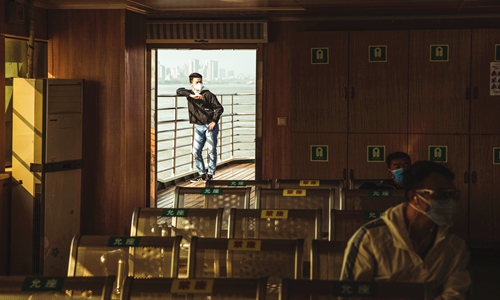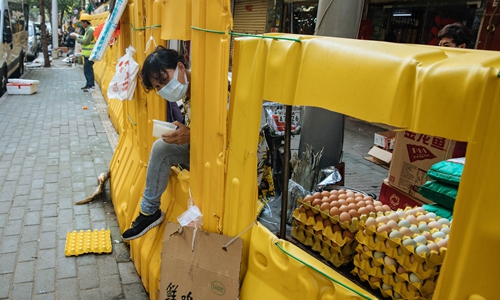Recovery pains
By Zhao Yusha in Wuhan Source:Global Times Published: 2020/5/6 19:33:40 Last Updated: 2020/5/7 0:43:02
Wuhan has squashed COVID-19 but psychological trauma holds firm in the aftermath

Passengers keep a social distance while crossing the Yangtze River on a ferry in Wuhan, Central China's Hubei Province, on April 16. Photo: Li Hao/GT
No new increase in cases, not a single patient in critical condition and no hospitalized COVID-19 patients send positive signs for Wuhan as many of its residents stepped out of their doorsteps for the first time in nearly 100 days since a citywide lockdown. They are able to celebrate the phased victory in the battle with the coronavirus finally receding in the former global epicenter.
But extreme fear of the lockdown, the grief of losing loved ones to the virus, and feelings of helplessness when patients passed away before their eyes still linger for many residents and medical staff. While threats to physical health may have disappeared, their emotional scars may take longer than just four months to heal.
"I've been dreaming millions of times to go out when the city was sealed off. But when all people around me went out during Labor Day holiday, I preferred to stay in. Darkness makes me feel safer than anything else," Chang Miao (pseudonym) told the Global Times.
Chang said she panicked when Wuhan imposed a lockdown in late January, and ever since, she began to vent out her stress by overeating, and constantly calling hospitals because of the fear she contracted the coronavirus.
"One day I called hospitals 50 times asking them if I had the virus, whilst clenching a thermometer in my hand. When I was told by doctors that I overreacted, I was exasperated and began overeating. Eating became my spiritual brace. I would be depressed when I stop eating, and I ceased talking to my parents and friends during that time. I felt hopeless and helpless," said Chang.
When the burden became unbearable, she finally reached out to a psychological hotline in late February for help.
Not alone
Chang was not the only person who did not contract the virus but was psychologically traumatized by it. According to Du Mingjun from Hubei Psychological Consultant Association, which opened a hotline for Wuhan residents seeking psychological comfort on January 23 - the day Wuhan was sealed off, she received more than 2,000 calls until late April.
Although Du said the calls gradually diminished as the virus ebbed, the scars left may take much longer to heal.

Vendors in isolation open holes through the fence in Mingyi Street in Wuhan on Saturday. Photo: Li Hao/GT
The Chinese Academy of Sciences also set up a psychological counseling branch in Wuhan in March. Wu Kankan, who works in the branch, said they were scheduled to be stationed in Wuhan for at least two years "because the pain in people's hearts won't go away easily."
Du described the past four months as an "intense period with pouring grief," unprecedented in her decades of working as a therapist. "It almost overwhelmed me…It was like something I've ever experienced."
Many who went to seek consultation from Du were those who lost their beloved ones. Du said one day she received a call from a 70-year-old father who contracted the virus with his son, but survived whilst his son died. The father told her he never expected losing his son in this way during a peaceful era.
Du said her heart rapidly sunk when the father's voiced trembled as he recalled coming back home to see his son's cloth, furniture and other items.
"He said he was not ready," Du said.
"For most people, their farewell to loved ones was only by a phone call. Their grief was only amplified and concretized when they went to collect ashes and belongings of the deceased ones," she said.
In early April, a video went viral online prompting empathetic comments from many netizens. It recorded Chang Silin (pseudonym) in his 30s collecting his dead father's phones and wallets in the hospital. After receiving the carefully wrapped items, Chang, wearing masks and goggles, asked the doctor, "Did my father say anything? Because he failed answer my phone calls later on," and silently burst into tears.
In a video interview with the Beijing News, Chang said after his father's death, his mother was silent and alone. "But my mother is very strong … I have to survive, and live healthy for my mom," said Chang.
"I got fewer calls since mid-March when the spread of the virus was gradually tamed. But people's emotions began to punctuate around Qingming Festival [China's tomb sweeping festival], when people had a chance to collect their deceased family's urns," said Du.
Psychologists warned mental burden for patients in several conditions also should not be overlooked. "The number of such people is not much - about thousands or tens of thousands in Wuhan. But they were traumatized twice psychologically: first strong anger and fear which were generated by a decline of strained hospital resources in the early stage followed by the psychological trauma of painful treatment, a process described by someone as 'living death,'" said Jiang Guangrong, a professor from school of psychology, Central China Normal University.
Wuhan resident Jin Yang (pseudonym) was once in severe condition, but his situation improved after being hospitalized for 60 days. However, he then encountered a drop-dead halt when he tested both positive and negative from different nucleic acid tests respectively.
"I was told by nurses to have to wait 28 days, and then another 28 days… it went on and on. Can you imagine? It was pure desperation. One day I could not take it anymore and I told the nurse I want to die instead," Jin told the Global Times.
Du said such patients were not rare but there's an easy cure for them. She said she often encourages family members to communicate with those people and help them walk out. Feeling the love from family, their responsibility for family and for the people who love them awakens, and the intention to die goes into ashes, said Du.
"I saw fear, desperation and anger during the past four months, but what I saw more, was how the cure for those negative feelings are love, responsibility and courage," said Du.
RELATED ARTICLES:
Posted in: IN-DEPTH